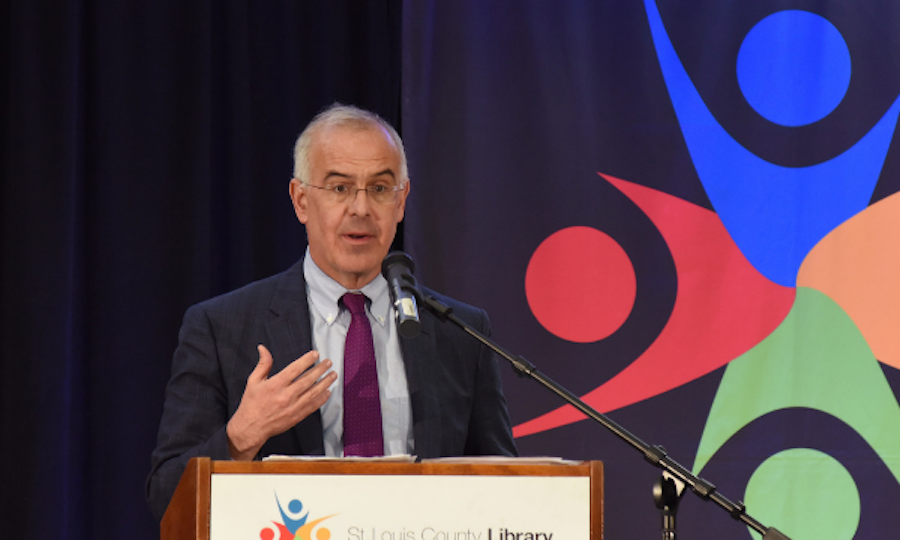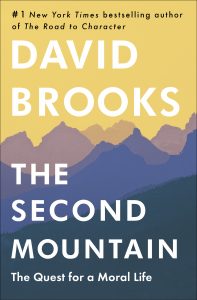Author David Brooks Is On a Quest For a Larger Purpose

The following is an excerpt from “The Second Mountain: The Quest For a Moral LIfe” by David Brooks
One of the most sophisticated methodologies for convening that I have seen is in Baltimore, in an organization called Thread, co-founded by Sarah Hemminger. When Hemminger was a girl in Indiana, her father discovered that their pastor was dipping into church funds. He reported this to the congregation, but instead of firing the pastor, the community shunned Sarah’s family. Sarah and her siblings would sit at parties and neighborhood events, and nobody would talk to them. She spent eight years of her childhood ostracized.
In response, she focused her energy in two ways. She became a nationally competitive figure skater, practicing up to eight hours a day. And she focused her energies on schoolwork. She eventually went on to get a PhD in biomedical engineering from Johns Hopkins, and got an offer for a position at the National Institutes of Health.
But, because of the shunning, she always had a special sensitivity to those who were outsiders, those who were lonely. As a freshman in high school, she noticed a boy named Ryan early in his time in school had drifted further and further into isolation and failure, as his own home life crumbled. Six teachers built a support structure around the boy. He turned his academic record around, was accepted into the U.S. Naval Academy, and, finally, years later, married Sarah.
One day, when she was working on her PhD at Hopkins, she happened to drive by Paul Laurence Dunbar High School in Baltimore. She was lonely and wanted to find a way to connect with people she could understand. She thought that maybe she could help students in Baltimore city schools the way people had helped Ryan. She decided she would find volunteers to rally around them, as she and the teachers had rallied around him. She asked the principal to give her the names of the most academically underperforming students at the school. She persuaded them to come see her—mostly by offering them pizza—and then asked if they’d be willing to help her develop a program. Most were happy to join, provided there was more pizza. She then convinced dozens of Hopkins students to volunteer and act as extended family members for the kids: driving them to school, bringing them lunch, driving them back to school when they skipped out, doing homework with them, taking them camping.
Sarah didn’t fully appreciate it at the time, but a commitment had been made. Her science career was never going to happen. She formed Thread, which weaves a web of volunteers around Baltimore’s most academically underperforming teenagers. Each student has up to four volunteers in their Thread family. Each volunteer is coached by another volunteer, called the head of family, who serves as a support system for family volunteers. The HOF is coached by a still more experienced volunteer called a grandparent. The grandparents are coached by community managers, who are paid Thread staffers. Circling the whole system of relationships are Thread collaborators, who offer special expertise—legal help, SAT tutoring, mental health counseling, and so on. When students first get involved, they sign a contract saying they will be active in Thread for ten years. In this commitment, there is no early exit and no dropping out.
The nominal point of Thread is to help underperforming teenagers. The real point of Thread is to build a web of relationships that stretches across the (so far) 415 students and the 1,000 volunteers. The real point is to create a community in which it is possible to fight off loneliness—Sarah’s as much as anybody else’s.
Often kids are wary as they begin Thread. As a few of them told me, they’d never had anyone consistently and unconditionally show up for them, and so they were suspicious and resentful when it started happening. Their first urge is often to flee, to reject the intrusion. Distrust is their resting state. But the Thread volunteers just keep showing up.
“Unconditional love is so rare in life that it is identity changing when somebody keeps showing up even when you reject them,” Sarah says. “It is also identity changing to be the one rejected.”
Sarah’s commitment is not to the Thread model; she’d change the organization in a minute if she felt it was right. It’s to the whole web of relationships. It’s to the community. It’s to Baltimore. Dozens of cities have asked Sarah to replicate Thread in their town, but she has turned them down. It’s better to go deep in Baltimore. There’s a pendant featuring a little map of the city on the necklace she wears every day. She is committed not to community in the abstract. She is committed to this one place and hopes that when Thread is big enough, it can change the fabric of the entire city.
Thread is very systematic about the way relationships are structured. There is also a very systematic way of tracking contacts between the people in the community. Thread has created an app called Tapestry, which tracks every time a volunteer has a touchpoint with one of the young people. Tapestry can track how often a young person has touchpoints, who hasn’t had a touchpoint recently, and how concentrated touchpoints correlate to other outcomes. Sarah calls it the Fitbit of social relationships. Like a lot of the best community builders, Hemminger combines a yearning heart with an engineer’s head. And like a lot of the best community builders, she has no recognition that she is doing anything extraordinary.

From THE SECOND MOUNTAIN by David Brooks, published by Random House, an imprint and division of Penguin Random House LLC. All rights reserved. No part of this excerpt may be reproduced or reprinted without permission in writing from the publisher.
This excerpt was featured in the May 26th edition of Maria Shriver’s Sunday Paper newsletter. The Sunday Paper is the paper of record for individuals who want to be Architects of Change, lead meaningful lives and Move Humanity Forward. To get inspiring and informative content like this essay delivered to your inbox each Sunday morning for free, click here to subscribe.
READ MORE STORIES THAT MOVE HUMANITY FORWARD
READ MORE STORIES THAT MOVE HUMANITY FORWARD
SIGN UP FOR MARIA’S SUNDAY PAPER

